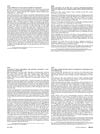 April 2016 in “Journal of The American Academy of Dermatology”
April 2016 in “Journal of The American Academy of Dermatology” A child on life support experienced rapid hair loss due to severe illness affecting hair growth.
 May 1993 in “Medical Clinics of North America”
May 1993 in “Medical Clinics of North America” Surgical hair replacement is a viable option for male pattern baldness when done with proper planning and realistic expectations.
 January 2015 in “Springer eBooks”
January 2015 in “Springer eBooks” Fat-derived stem cells and their secretions show promise for treating skin aging and hair loss.
 93 citations,
February 2015 in “Journal of Investigative Dermatology”
93 citations,
February 2015 in “Journal of Investigative Dermatology” Oxidative stress affects hair loss in men with androgenetic alopecia.
 18 citations,
July 2022 in “Frontiers in Immunology”
18 citations,
July 2022 in “Frontiers in Immunology” Volatile organic compounds can cause inflammation and increase the risk of autoimmune diseases.
 12 citations,
August 2022 in “Journal of Controlled Release”
12 citations,
August 2022 in “Journal of Controlled Release” A new microneedle patch effectively promotes hair growth by increasing blood vessel formation around hair follicles.
 1 citations,
August 2022 in “Медицинский совет”
1 citations,
August 2022 in “Медицинский совет” The treatment with an oral drug and topical lotion is effective and well-tolerated for hair loss after COVID-19.
 August 2023 in “Dermatologic Surgery”
August 2023 in “Dermatologic Surgery” Wounding may stimulate hair growth, but more research is needed to confirm the safety and effectiveness of related treatments.
 March 2022 in “IntechOpen eBooks”
March 2022 in “IntechOpen eBooks” Botulinum Neurotoxin-A can treat acne, oily skin, rosacea, hair loss, prevent scars, relieve nerve pain, reduce excessive sweating, and manage psoriasis, but more trials are needed to confirm its effectiveness.
 September 2017 in “Journal of Investigative Dermatology”
September 2017 in “Journal of Investigative Dermatology” The Siah1 and Siah2 genes are active in mouse skin development and hair growth, especially right after birth.
January 2022 in “Stem cell biology and regenerative medicine” Improving dermal papilla cells can help regenerate hair follicles.
 6 citations,
January 2012 in “Hair transplant forum international”
6 citations,
January 2012 in “Hair transplant forum international” Best solution for storing hair grafts is saline with ATP at 4 degrees Celsius, but no definitive best method was confirmed.
 December 2021 in “Indian Journal of Dermatology, Venereology and Leprology”
December 2021 in “Indian Journal of Dermatology, Venereology and Leprology” Men with androgenetic alopecia, or hair loss, often have abnormal blood flow in their small blood vessels, which might be linked to inflammation and stress.
 September 2022 in “Journal of The American Academy of Dermatology”
September 2022 in “Journal of The American Academy of Dermatology” A woman's COVID-19 related hair loss improved after using a specific hair care routine for 30 days.
27 citations,
August 2021 in “Journal of Autoimmunity” Human dermal γδT-cells respond to stress in hair follicles, contributing to hair loss.
92 citations,
September 2013 in “Journal of Investigative Dermatology” BMAL1 and Period1 genes can influence human hair growth.
 November 2024 in “Clinical Cosmetic and Investigational Dermatology”
November 2024 in “Clinical Cosmetic and Investigational Dermatology” Rosemary oil may effectively treat hair loss with fewer side effects, but more research is needed.

New treatments for hair loss should target eight main causes and use specific plant compounds and peptides for better results.
 June 2023 in “Stem cell reviews and reports”
June 2023 in “Stem cell reviews and reports” Stem cell therapies could be a promising alternative for hair loss treatment, but more research is needed to understand their full potential and safety.
 June 2024 in “Computational and Structural Biotechnology Journal”
June 2024 in “Computational and Structural Biotechnology Journal” Multi-omics techniques help understand the molecular causes of androgenetic alopecia.
 3 citations,
September 2019 in “Journal of Orthodontics”
3 citations,
September 2019 in “Journal of Orthodontics” A boy's hair grew back after he stopped using orthodontic headgear that caused temporary hair loss.
 4 citations,
April 2002 in “Medical Hypotheses”
4 citations,
April 2002 in “Medical Hypotheses” Hormones cause hair loss by affecting cell growth and weakening cell attraction.
 1 citations,
September 2017 in “Journal of Investigative Dermatology”
1 citations,
September 2017 in “Journal of Investigative Dermatology” Blocking a specific enzyme can reduce the negative impact of stress hormones on hair growth cells.
 December 2023 in “Journal of materials chemistry. B”
December 2023 in “Journal of materials chemistry. B” A new nanoemulsion increases oxygen for hair cells, leading to better hair growth.
 September 2017 in “Journal of Investigative Dermatology”
September 2017 in “Journal of Investigative Dermatology” The study found that sweat glands normally suppress immune responses, but this is disrupted in certain skin diseases, possibly contributing to their development.
 September 2017 in “Journal of Investigative Dermatology”
September 2017 in “Journal of Investigative Dermatology” Researchers created human cells that can turn into sebocytes, which may help study and treat skin conditions like acne.
 September 2017 in “Journal of Investigative Dermatology”
September 2017 in “Journal of Investigative Dermatology” Finasteride helps female-pattern hair loss.
 25 citations,
September 2014 in “Dermatologic Surgery”
25 citations,
September 2014 in “Dermatologic Surgery” Hair transplants can effectively treat hair loss from CCCA in African American women if there's no inflammation.
 23 citations,
December 2013 in “Regenerative Medicine”
23 citations,
December 2013 in “Regenerative Medicine” Hair follicle culture helps develop new treatments for hair loss.
 17 citations,
April 2020 in “Dermatology and Therapy”
17 citations,
April 2020 in “Dermatology and Therapy” The PRP-like cosmetic product with postbiotics effectively treats hair loss in Alopecia areata.



























